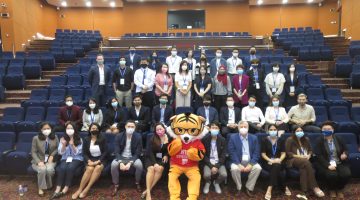Sustainability: Decarbonising the Construction Sector
Class of 2023 Laurent Corpataux shared his views on sustainable construction in Southeast Asia with Joël Henri Brunner, Science Counselor at the Embassy of Switzerland in Singapore in a recent video interview.
https://www.youtube.com/watch?v=5A0aQYdiJmY
He also shares here how the programme has helped him further his passion and career in sustainability.
What are you doing now?
I’m currently doing my part-time MBA at the National University of Singapore, and I’m also Head of Singapore for the Häring Group, a Swiss sustainable construction company with its Southeast Asia base in Singapore. I am leading our regional strategy and organisation along the value-chain of forestry, timber and construction.
What excites you about this industry?
The construction sector is not particularly considered sustainable. The building and construction sector is responsible for approximately 40% of energy-related global CO2 emissions. That is big. Thus, if we do not start to look into sustainable design and construction, it would be extremely difficult to tackle climate change. I see those challenges as exciting opportunities.
Sustainability in construction and real estate should start with the question of whether new buildings need to be built in the first place, or whether existing buildings could be retrofitted for new purposes. If new buildings are necessary, then, amongst others, the use of sustainable building materials is crucial. Currently, the production of cement and steel contributes to about 13% to the global CO2 emissions while urbanisation of cities is set to rise in the coming decades, according to a United Nations report. A way to tackle this conundrum is by using one of the oldest building materials in the world, timber, and turning it into a 21st-century state-of-the-art mass engineered construction material. That is what I am currently pursuing.
Trees capture and store carbon as they grow. This carbon is locked in the biomass of the trees; once harvested and processed into products, the carbon is still locked in the products. Engineered timber products from sustainably managed forests store up to 1 tonne of CO2 per m3 of material, making it a carbon-negative building solution and effectively help offset carbon. The further beauty of so called “mass timber” products is that they are structurally able to compete with concrete and steel.
To drive change in construction and real estate, however, I got to learn that it is important to cooperate with various stakeholders across the value chain. Finance, real estate, builders, architects, and engineers (and more) all need to collaborate to create sustainable impact. I am excited to work and drive such collaborations, which are essential for creating impact and scalability in the field of sustainability and construction overall.
How have you leveraged The NUS MBA to further your career in this industry?
The NUS MBA has provided me access to a world-class faculty that helped me to sharpen my critical thinking as a leader. The core curriculum at NUS provides invaluable lessons on business management, including experiential learning opportunities that help to simulate high-stress business situations. Reflecting on those experiences and getting direct constructive feedback from my MBA peers have helped me to continuously learn and improve. The business case discussions in the classroom, with the high probability of being cold-called, forces everyone to read the cases and prepare for discussions, as well as demands one to listen to others.
A delightful experience at NUS Business School was the module Corporate Strategy (CS), taught by Prof Nitin Pangarkar, who is the current Academic Director of the NUS MBA. Besides conducting business simulations, CS also introduced us to strategy frameworks that are useful in my current career.
Overall, NUS Business School has an exceptional composition of outstanding professors, curriculum, strong alumni network, and very capable fellow peers.


